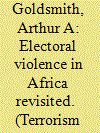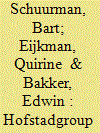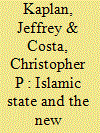|
|
|
Sort Order |
|
|
|
Items / Page
|
|
|
|
|
|
|
| Srl | Item |
| 1 |
ID:
142524


|
|
|
|
|
| Summary/Abstract |
What role do weaker actors play in determining the outcomes of irregular wars? The literature on counterinsurgency outcomes has tended to explain weak-side victory either as a result of informational asymmetries caused by constraints on counterinsurgent forces, or as a result of suboptimal strategic choices by the state. We suggest that this underplays the role of insurgents themselves; we attempt to “bring the insurgents back in,” giving variation in insurgent polity a role in explaining their own victories and defeats. In order to do so, we focus inductively on a relatively novel pool of cases: Great Britain's wars in India from the mid-eighteenth to early nineteenth centuries. Doing so allows us to hold the counterinsurgent side constant while evaluating variance among the insurgents themselves. We find that variance on the insurgent side is indeed significant in determining outcomes, and suggest possible reasons why this occurs.
|
|
|
|
|
|
|
|
|
|
|
|
|
|
|
|
| 2 |
ID:
142525


|
|
|
|
|
| Summary/Abstract |
This article addresses the still unsettled question of the incidence of violent election periods in Africa. It uses two new datasets, which report episodes of social conflict in the region for 1990–2011, and elections worldwide from 1960 to 2010. When combined, these data suggest that onsets of electoral violence peak around major election days in Africa as a whole, but with wide national variability in the volume of new episodes. Depending on the time span and type of social conflict, from one-quarter to three-quarters of the elections for national leadership have been without incident. The article also investigates the timing of electoral violence and the extent to which there is an experience curve effect, whereby subsequent elections have fewer onsets of social conflict. The data indicate that two-thirds to three-quarters of elections are free of onsets of social conflict, but that the proportion does not change much with experience. Overall, there appear to be reasonable grounds for optimism about peaceful elections in many African countries.
|
|
|
|
|
|
|
|
|
|
|
|
|
|
|
|
| 3 |
ID:
142529


|
|
|
|
|
| Summary/Abstract |
Despite the Dutch Hofstadgroup's status in the literature as a prime example of a homegrown Salafi-Jihadist terrorist network, the authors, using newly available primary sources, argue that this classification is to a large extent unwarranted. The lack of a rudimentary organizational structure, the existence of divergent views on the legitimacy and desirability of political violence, and the absence of collective action in pursuit of a violent goal rule out labeling the Hofstadgroup as a terrorist organization or network for the largest part of its 2002–2005 existence. A smaller subgroup of extremists did begin developing into a proto-terrorist inner circle from late 2003 onwards. In 2004, this extremist core brought forth the murderer of filmmaker Theo van Gogh. But it was only in 2005, when the remnants of the inner circle tried to resuscitate the Hofstadgroup in the wake of the arrests that had followed Van Gogh's death, that these individual actions were replaced by the communal efforts necessary to warrant the “jihadist network” label often ascribed to the Hofstadgroup. Arguably the most archetypical aspect of the Hofstadgroup case is its ability to illustrate the deleterious effects of the ongoing scarcity of primary sources-based research on terrorism.
|
|
|
|
|
|
|
|
|
|
|
|
|
|
|
|
| 4 |
ID:
142528


|
|
|
|
|
| Summary/Abstract |
The concept of “cumulative extremism”—described in 2006 by Roger Eatwell as “the way in which one form of extremism can feed off and magnify other forms [of extremism],” has recently gained considerable traction in academic, policy, and practitioner discourses about extremism. Yet in spite of the growing usage of the term, particularly in analyses of the dynamic between extreme Islamist and extreme Right-Wing or anti-Muslim protest groups, there has to date been scant interrogation of the concept itself or of its application. In this article, we make a series of six proposals as to how we might enhance the conceptual clarity of these conversations about “cumulative extremism.” Our aim in doing so is to increase the likelihood that the concept might become a useful addition to the debates on extremism rather than becoming, to borrow a term from John Horgan—something of an “explanatory fiction”—an idea that appears to enable us to explain a great deal, but whose explanatory value is largely lost because there is insufficient scrutiny of the claims that it is used to make and whose liberal application becomes increasingly conducive to poor science.
|
|
|
|
|
|
|
|
|
|
|
|
|
|
|
|
| 5 |
ID:
142530


|
|
|
|
|
| Summary/Abstract |
This article focuses on the apocalyptic zeitgeist of the Islamic State through the lens of what we call the New Tribalism. It finds that IS emerged from the Al Qaeda (AQ) milieu, but soon split with AQ as the messianic excitement surrounding Al-Baghdadi and his teachings grew. In common with previous millennial/messianic movements in all three “Peoples of the Book”—Judaism, Christianity, and Islam—IS soon evolved beyond the laws of the normative faith (antinomianism). We hold that for this reason, despite its claims of faith and fealty, IS has left the Islamic Umah behind, becoming a malign sectarian group of its own whose dynamism and successes are attracting a global audience and support from Muslims in almost every country. This helps to explain such abhorrent practices as forced conversion, sexual servitude, the destruction of historic artifacts, and mass executions. We find that the American invasion of Iraq was the vital first step in a series of events, which gave birth to IS. A thorough review of IS history and political culture traces these historic moments in time.
|
|
|
|
|
|
|
|
|
|
|
|
|
|
|
|
| 6 |
ID:
142527


|
|
|
|
|
| Summary/Abstract |
This article examines key setting events and personal factors that are associated with support for either non-violent activism or violent activism among Somali refugee young adults in the United States. Specifically, this article examines the associations of trauma, stress, symptoms of posttraumatic stress disorder (PTSD), posttraumatic growth (PTG), strength of social bonds, and attitudes towards legal and non-violent vs. illegal and violent activism. Structured interviews were conducted with a sample of Somali refugee males ages 18–25 living in the northeastern United States (N = 79). Data were analyzed using multiple linear regressions and path analysis. Greater exposure to personal trauma was associated with greater openness to illegal and violent activism. PTSD symptoms mediated this association. Strong social bonds to both community and society moderated this association, with trauma being more strongly associated with openness to illegal and violent activism among those who reported weaker social bonds. Greater exposure to trauma, PTG, and stronger social bonds were all associated with greater openness to legal non-violent activism.
|
|
|
|
|
|
|
|
|
|
|
|
|
|
|
|
| 7 |
ID:
142526


|
|
|
|
|
| Summary/Abstract |
This article aims to consider the factors which led to a serious under-representation of Catholics within the Ulster Defence Regiment (UDR) during the Northern Ireland “Troubles.” A considerable number of UDR members were implicated in collusion with loyalist paramilitaries in their targeting of Catholic civilians throughout the conflict. Further, neither the British political nor military establishment made any significant moves towards addressing Catholic grievances regarding the UDR during the crucially formative years of 1970–1972. Despite this, Catholic under-representation has often been discussed with sole or particular reference to Republican paramilitary targeting of Catholic members of the force; this is in order to dissuade any further such involvement on the part of this demographic. The validity of such assertions will be examined in this article, along with a number of other factors which have been hitherto largely underplayed or outright ignored as contributing to this under-representation.
|
|
|
|
|
|
|
|
|
|
|
|
|
|
|
|
|
|
|
|
|